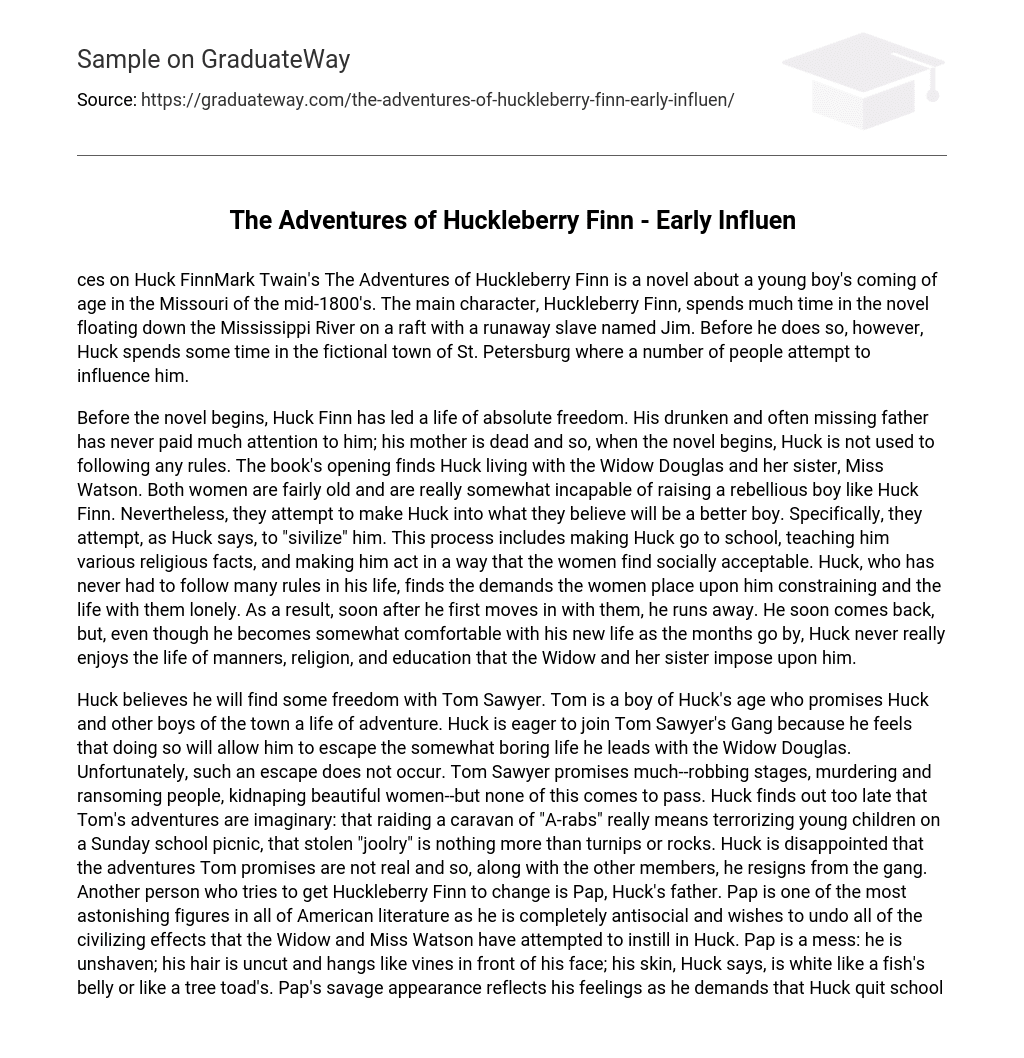The novel The Adventures of Huckleberry Finn by Mark Twain is a tale about the life of a young boy named Huckleberry Finn in mid-1800s Missouri. Huck and Jim, a fugitive slave, spend much time on a raft as they journey down the Mississippi River. Prior to embarking on their adventure, Huck resides in the fictitious town of St. Petersburg where he encounters several individuals who attempt to shape his opinions and actions.
Before the start of the novel, Huck Finn has experienced complete freedom. His negligent and often absent father has paid little attention to him, and his mother has passed away. As a result, when the story begins, Huck is unaccustomed to following any rules. At the beginning of the book, Huck is living with the Widow Douglas and her sister, Miss Watson. These two women are older and incapable of properly raising a rebellious boy like Huck Finn. However, they attempt to civilize him, as Huck describes it. This process involves sending Huck to school, teaching him religious facts, and molding his behavior to fit societal norms. Huck, who has always been free from strict guidelines, feels constrained by the women’s expectations and finds his life with them to be isolating. Consequently, shortly after moving in with them, he runs away. Although he eventually returns and becomes somewhat comfortable with his new life over time, Huck never truly embraces the manners, religion, and education that the Widow and Miss Watson impose on him.
Huck believes that he will find freedom by joining Tom Sawyer’s gang. Tom, who is around Huck’s age, promises an adventurous life to Huck and the other boys in town. Huck is eager to escape his relatively boring life with the Widow Douglas, so he eagerly joins Tom’s gang. However, the promised adventures do not materialize. Tom talks about robbing stages, murdering and ransoming people, and kidnaping beautiful women, but none of it actually happens. Huck eventually discovers that Tom’s adventures are all imaginary. For example, raiding a caravan of “A-rabs” actually means terrorizing young children on a Sunday school picnic, and stolen “joolry” turns out to be turnips or rocks. Disappointed by the lack of real adventure, Huck and the other members resign from the gang. Another person who attempts to change Huck is his father, Pap. Pap is an incredibly antisocial figure in American literature who wants to undo all the efforts of the Widow and Miss Watson to civilize Huck. Pap has a disheveled appearance, with an unshaven face and unkempt hair that hangs in front of his face like vines. Huck describes his skin as white like a fish’s belly or a tree toad’s. Pap’s savage appearance reflects his desires for Huck to quit school, stop reading, and avoid church.Huck manages to avoid being with Pap for some time, but Pap captures him several months after Huck moves in with the Widow and brings him to a secluded cabin deep in the woods of Missouri. In this setting, Huck experiences the freedom he had before the events of the book began. He is able to smoke, be lazy, use profanity, and essentially do as he pleases. However, much like his previous experiences with the Widow and Tom, Huck starts to grow discontent with this lifestyle. Pap’s violent nature becomes too much for Huck to bear, and he realizes that escaping from the cabin is necessary for his own survival. Worried about his well-being, Huck stages his own death in the cabin while Pap is away and flees to Jackson’s Island, a remote island in the Mississippi River.
After leaving his father’s cabin, Huck joins another important influence in his life – Miss Watson’s slave, Jim. Prior to Huck’s departure, Jim has been a minor character, gullibly manipulated by Tom Sawyer and predicting Huck’s future. Huck discovers Jim on Jackson’s Island, having run away upon overhearing his impending sale to New Orleans. Once together on the island, Huck soon realizes Jim possesses more talents and intelligence than he previously believed. Jim possesses knowledge of various signs for predicting the future, understanding people’s personalities, and forecasting weather. Huck finds this information valuable as they navigate the Mississippi on a raft. Additionally, Huck feels a sense of comfort with Jim that he hasn’t experienced with other central characters in the novel. With Jim, Huck can embrace the positive aspects of his previous influences. Like the Widow, Jim provides security for Huck, but is less restrictive. Similarly to Tom Sawyer, Jim is intelligent but not as overwhelming or imaginary. Like Pap, Jim allows Huck freedom, but does so with love instead of indifference. Thus, early in their relationship on Jackson’s Island, Huck expresses to Jim, “This is nice.”Huck’s current feelings of contentment in his current location sharply contrast with his earlier discomfort and desire to distance himself from others. The quote “I wouldn’t want to be nowhere else but here” reflects this sentiment.
At the end of chapter 11 in The Adventures of Huckleberry Finn, Huck and Jim must leave Jackson’s Island after Huck learns that people are searching for the escaped slave. Before their departure, Huck warns Jim by saying, “They’re after us.” This remark signifies Huck’s identification with Jim and his growing affection for him. Such empathy demonstrates that the two marginalized individuals will develop a prosperous and gratifying friendship as they continue their journey down the river in the novel.





